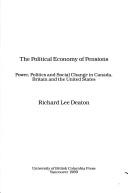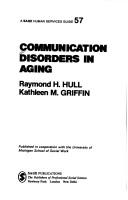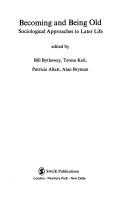| Listing 1 - 10 of 53 | << page >> |
Sort by
|

ISBN: 0774803185 Year: 1989 Publisher: Vancouver University of British Columbia press
Abstract | Keywords | Export | Availability | Bookmark
 Loading...
Loading...Choose an application
- Reference Manager
- EndNote
- RefWorks (Direct export to RefWorks)
Book
Year: 1989 Publisher: Cambridge, Mass. National Bureau of Economic Research
Abstract | Keywords | Export | Availability | Bookmark
 Loading...
Loading...Choose an application
- Reference Manager
- EndNote
- RefWorks (Direct export to RefWorks)
Some contend the US labor market will fail to adapt smoothly to an aging workforce, whereas others argue that employee pensions can and will play an important role in helping companies induce desired turnover patterns. This paper undertakes a longitudinal examination of pension retirement incentives in several dozen plans observed between about 1960 to 1980. The plans under study instituted many changes over this period, several of which enhanced the financial payoff to early retirement. These alterations included increases in benefit levels, reductions in early, normal and mandatory retirement ages, and cuts in the age at which pension present values peak (with retirement after that age penalized). We also find that simple indicators of pension plans' structural features (e.g. the plan's early retirement age) do not adequately summarize the complex financial incentives inherent in pensions, so that most of our attention is directed to analysis of financial benefit level measures. Three major explanations for observed pension outcomes are evaluated empirically. Of special policy interest is an evaluation of pension responses to changes in Social Security benefit rules. Additionally, key differences in behavior are discovered between single employer and multiemployer pension plans. We conclude that pension plan behavior is systematically related to both labor and product market characteristics, and is responsive to retirement income policy.

ISBN: 0803931247 Year: 1989 Publisher: Newbury Park (Calif.) : Sage,
Abstract | Keywords | Export | Availability | Bookmark
 Loading...
Loading...Choose an application
- Reference Manager
- EndNote
- RefWorks (Direct export to RefWorks)
Communicative disorders in old age. --- Communicative Disorders --- in old age.

ISBN: 0306430479 Year: 1989 Publisher: New York, NY ; London : Plenum Press,
Abstract | Keywords | Export | Availability | Bookmark
 Loading...
Loading...Choose an application
- Reference Manager
- EndNote
- RefWorks (Direct export to RefWorks)
AGING --- NUTRITION --- IN OLD AGE --- AGING --- NUTRITION --- IN OLD AGE

ISBN: 0803981708 9780803981706 Year: 1989 Publisher: London Sage
Abstract | Keywords | Export | Availability | Bookmark
 Loading...
Loading...Choose an application
- Reference Manager
- EndNote
- RefWorks (Direct export to RefWorks)
Book
ISBN: 9090030360 Year: 1989 Publisher: Nijmegen : Hyspeed,
Abstract | Keywords | Export | Availability | Bookmark
 Loading...
Loading...Choose an application
- Reference Manager
- EndNote
- RefWorks (Direct export to RefWorks)
Book
ISBN: 9782763771342 2763771343 Year: 1989 Publisher: Québec: Presses universitaires de Laval,
Abstract | Keywords | Export | Availability | Bookmark
 Loading...
Loading...Choose an application
- Reference Manager
- EndNote
- RefWorks (Direct export to RefWorks)
Older people --- Aging --- Old age
Book
ISBN: 9060651499 Year: 1989 Publisher: Alphen a. d. Rijn : Stafleu,
Abstract | Keywords | Export | Availability | Bookmark
 Loading...
Loading...Choose an application
- Reference Manager
- EndNote
- RefWorks (Direct export to RefWorks)

ISBN: 070060412X 0700604138 Year: 1989 Publisher: Lawrence University Press of Kansas
Abstract | Keywords | Export | Availability | Bookmark
 Loading...
Loading...Choose an application
- Reference Manager
- EndNote
- RefWorks (Direct export to RefWorks)
Book
ISBN: 0471926396 Year: 1989 Publisher: Chichester : Wiley,
Abstract | Keywords | Export | Availability | Bookmark
 Loading...
Loading...Choose an application
- Reference Manager
- EndNote
- RefWorks (Direct export to RefWorks)
Aged --- Memory --- Mental processes, in old age. --- Psychology. --- In old age.
| Listing 1 - 10 of 53 | << page >> |
Sort by
|

 Search
Search Feedback
Feedback About UniCat
About UniCat  Help
Help News
News